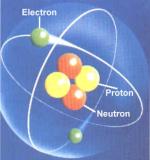|
This section contains 655 words (approx. 3 pages at 300 words per page) |

|
In the early 1830s, Michael Faraday carried out a series of historic experiments on electrolysis. He found that a given amount of electrical current always liberates a given amount of any substance. One conclusion that Faraday drew from these results was that electricity might consist of "atoms of charge." James Clerk Maxwell used the term "molecular charge of electricity" to describe Faraday's results, but doubted that "particles" of electricity really existed.
The most clear-cut statement of this concept was made by the Irish physicist, G. Johnstone Stoney in 1874. Stoney said that electrolysis could best be understood by thinking in terms of "units of electricity." Nearly twenty years later, in 1891, Stoney proposed the name electron for this unit of electricity.
Faraday's original analysis of "atoms of charge" received a mixed response from colleagues. To many scientists, Faraday's results and those of Svante August Arrhenius on solution chemistry seemed to...
|
This section contains 655 words (approx. 3 pages at 300 words per page) |

|


